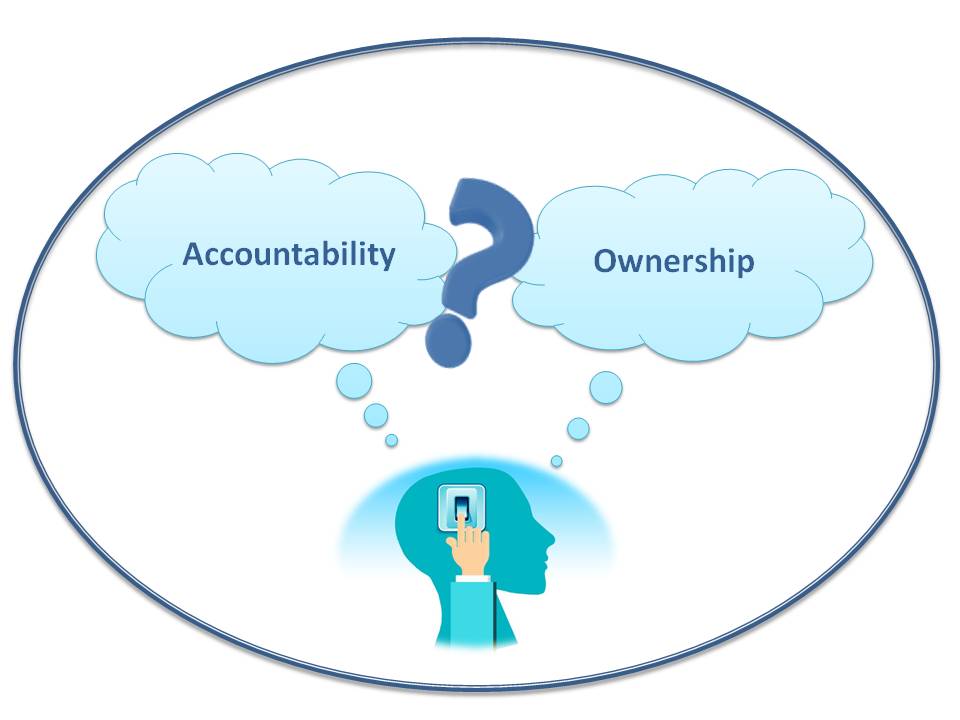Many people either consider the terms “Being Accountable” and “Taking Ownership” interchangeable, or they forget about taking ownership altogether and focus only on holding people accountable for their actions and goals. But there are some very subtle (and highly important) differences between the two that change how we look at them in terms of our own actions, as well as the results we ask of our people.
Accountability refers to what your goals are; taking ownership refers to how you accomplish them.
Rather than merely striving for an overall accountability goal, taking ownership means you do whatever is necessary to ensure quality service every step of the way, so that when all tasks are added together, you not only succeed at achieving the goal, but ensure that each task necessary to achieve it is highly successful in its own right.
For example, this month you may have served 20 people well and reached your accountability goal, but you may have also dis-served 30 others in the process. If you’re focused solely on the goal, rather than on the individual experiences and interactions that comprise the goal, you basically allow yourself to believe that it’s OK not to WOW any particular individual, as long as you get enough people to do what you want them to. It other words, OK experiences (in fact, many OK experiences strung together) are acceptable as long as you reach your goal.
I’m reminded of an experience with a fitness center whose representatives disappointed us at every turn (from pretending not to know about local offers and then suddenly “remembering” them, to not listening to what we wanted and trying to sell us services we didn’t need, to their complete inflexibility regarding how they dispensed information about their services and fees). The topper came when we asked about contracts and discovered theirs was unacceptable, to which the representative replied, “Well, if you think that’s bad, you should see the guys down the street… they lock you in for a LOT longer than we do! At least we’re not as bad as they are!” What? So, let me get this straight: your marketing position is that, rather than being the best choice around, you’re the “lesser of two evils?” This rep may be meeting his accountability goals, but he sure ticked us off along the way… and after talking with friends about this, we discovered we’re not alone.
What does it do to the organization, your reputation and everyone’s success if everyone isn’t focused on creating individual WOW experiences? It’s sort of like being “penny-wise and pound-foolish” (in reverse). In this popular saying, you watch the pennies and blow many pounds… but in our scenario, you watch the pounds (the goals), while blowing many pennies (the tasks that comprise the goals) along the way.
This is especially troubling when you remember that nowadays – in this age of social media – dissatisfied customers can tell 5,000 “close friends” about their experience with you, allowing everyone who reads it to draw the wrong conclusion based on one imperfect experience!
But if you pride yourself on the quality of your work, “Just OK” experiences are never acceptable, and you will work to make each one a WOW, regardless of the status of the goal. By taking ownership for creating a WOW experience for each person you serve, all 50 in our above example will be well served, causing you to nearly triple your goal and setting the groundwork for much higher success in the future!
In other words, success is not about the goal; it’s about how we treat people as we’re striving for the goal. If we treat people well, the goal will take care of itself.
Accountability pertains only to our own job and goals; taking ownership refers to our willingness to help in other areas, even if it’s not technically “our job.”
When we’re accountable for our goals, we’re focused on the goals that pertain to our own little world. But taking ownership means that we’re concerned with the success of the entire organization, not just our own job duties.
As a result, we become more observant and start noticing things that are outside the technical scope of our own jobs. When we notice something that needs to be done anywhere in the organization, we either do it, help someone else do it, or at the very least bring it to someone’s attention so the proper person can take care of it. Taking ownership means refusing to ignore a problem just because “it’s not my job.”
Accountability has a “ceiling” represented by the overall goal; taking ownership has no ceiling or cap because it focuses on individual actions or tasks, one at a time, regardless of the status of the goal.
Once you reach your goal, you can call it a day (and stop trying so hard on the remaining tasks during the period of accountability). For example, once you reach your accountability goal of $20,000 in sales each month, you may do things a little slower, not try so hard to please the next person, or take a little longer returning that phone call from a potential customer. We’re all tempted at times to feel, “I’ve earned a little break because I’ve met my goal.”
But taking ownership for creating a WOW for 100% of my past, current and potential clients – no matter when they call or where I am with respect to my monthly accountability goal – means that no one’s phone calls get put off… even if it means that I call, text or e-mail them just to tell them I can’t speak with them at that moment but will call them soon, so they know they haven’t been forgotten and aren’t being ignored.
Accountability is “forced” on us from external sources; taking ownership comes from within and requires our own initiative.
This is actually a more powerful factor than it may appear on the surface. Because one is forced on us, it has a fairly negative connotation (even though it often does produce positive overall results). The other is based on internal drive and motivation and therefore has a more positive connotation. Whenever we draw upon people’s inner drive and motivation, they often hold themselves accountable – and external accountability becomes merely the final “formality” in the process of achieving our goals.
Relying solely on accountability also allows human nature to work against us, sometimes causing us to “rebel” in one way or another. The story of a young college student I know comes to mind. While we were talking one day, she said something startling. She was telling me about her current grades and number of absences from class and calculating how many more days she could afford to be absent, as well as the minimum score she needed on her final exam, in order to still pass the course! Rather than planning to attend every class and get the best possible grades… period, she was actually calculating how LITTLE she could get away with doing and still get a passing grade!
The same sometimes holds true in our professional lives. If we’re not vigilant, even the most dedicated people can succumb to the temptation to work until they reach the established goal – just to satisfy their boss and keep their job – and then, they’re done. But if their inner drive is activated, and we keep them focused on excellence during each individual activity, they won’t be satisfied with the bare minimum needed to reach the goal; they will strive to be the best they can be on every interaction.
The upshot is that both accountability and taking ownership are a two-way street. Neither leaders nor team members can (or should) expect others to do their respective parts in the process if they themselves are not ready, willing and able to do their own.
This means that if a broken process, policy, or procedure is brought to a team member’s attention by a customer, the team member doesn’t just ignore it or tell the customer, “That’s the way it’s done – you’re out of luck!” (I once had a phone rep tell me, in response to my suggestion to improve a process, “I can tell them, but they won’t listen… they never do!” OUCH!)
Likewise, if a similar issue is brought to a leader’s attention by a front line representative, the leader doesn’t ignore them or tell them, “That’s the way it’s done – live with it!”
For example, if a customer calls a contact center and their issue can’t be resolved on the first call, is the rep able to call the person back? Or give the customer a number on which to call them personally? Or pass it along to someone else personally? Can they follow up to ensure it was done, rather than handing it off and forgetting about it? If not, will leaders work to fix that process… or simply let it be, forcing the customer to call back time and time again until they finally resolve the issue through their persistent and diligent efforts… not the company’s?
Here’s the kicker: No one is immune from the process. Taking ownership and holding people accountable only work when both concepts apply all the way up and down the line, with leaders and team members alike being just as committed to taking ownership and being accountable as they expect the next person to be.
So, the next time we hold ourselves or anyone else accountable for a certain goal, let’s ensure that we also take ownership for the highest level of success of every element that comprises that goal, making the goal not only easier to achieve, but highly likely to be exceeded.
What are your thoughts on accountability versus taking ownership? I’d love to hear from you!


